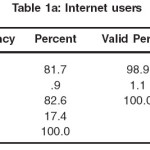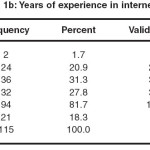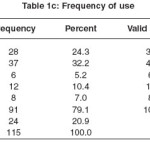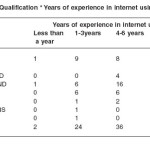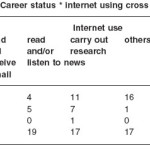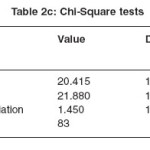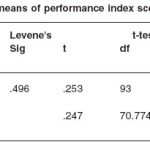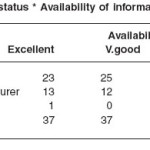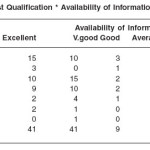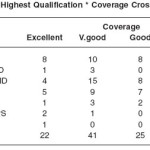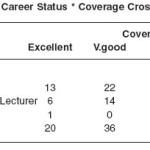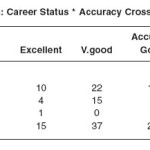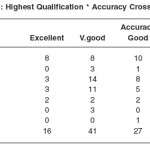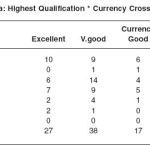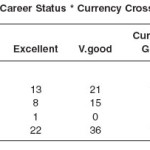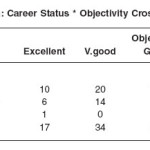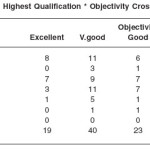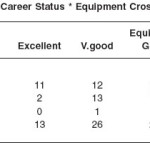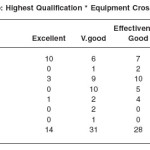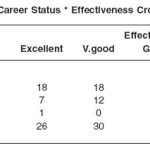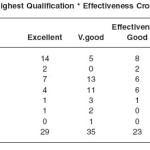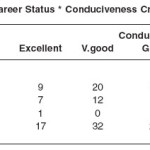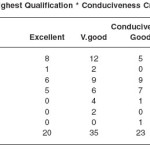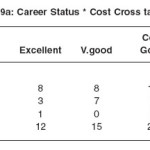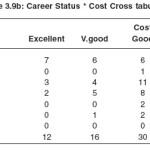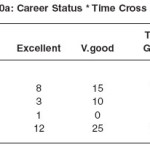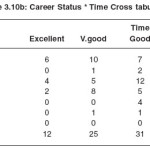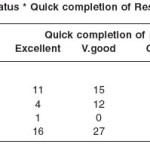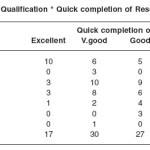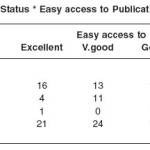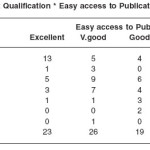B. A. Ojokoh¹*, O. S. Adeola¹ and D. M. Okewole²
1Department of Computer Science Federal, University of Technology, P.M.B. 704, Akure (Nigeria)
2Department of Mathematical Sciences, Redeemer’s University, Ogun State (Nigeria)
Article Publishing History
Article Received on :
Article Accepted on :
Article Published :
Article Metrics
ABSTRACT:
The benefits accrued from the advent of the Internet especially in developing countries can not be overemphasized. At the click of a button on a desktop, Internet users can have access to vast information that covers almost all areas of human endeavors. This has made Internet the greatest achievement of the century. Research in the past for all levels of Nigerian researchers used to be tedious and done under stress. Most times, there used to be inadequate information that is required to produce qualitative and timely output. This could result in substandard research output. Additionally, oftentimes research persons failed to meet up with set deadlines. These days, researchers have experienced tremendous improvement in access to vast amount of data and information required to produce competitive research result. There is the need to evaluate the depth of the impact of Internet on research, hence a kind of research like this. The research was carried out with the use of questionnaires administered to some higher institutions in Nigeria and the views of various levels of researchers were analyzed based on a number of factors. From the study, confirmation was made of the positive impact of Internet on research and recommendations were made based on the factors identified to be hindering the maximal utilization of the Internet for research in the Nigerian situation.
KEYWORDS:
University, IT; analysis; education
Copy the following to cite this article:
Ojokoh B. A, Adeola O. S, Okewole D. M. Evaluating the Impact of Internet on Research in Nigeria. Orient. J. Comp. Sci. and Technol;1(1)
|
Copy the following to cite this URL:
Ojokoh B. A, Adeola O. S, Okewole D. M. Evaluating the Impact of Internet on Research in Nigeria. Orient. J. Comp. Sci. and Technol;1(1). Available from: http://www.computerscijournal.org/?p=2016
|
Introduction
The internet can be conceived as a rich, multi-layered, complex, ever-changing textual environment. The internet provides several opportunities for the academia. It is a mechanism for information dissemination and a medium for collaborative interaction between individuals and their computers without regard for geographic limitation of space (Okerson, 1991; Singh, 2002). It is a ‘live’, constantly ‘moving’, theoretically borderless, potentially infinite space for the production and circulation of information. This global village is a library of fun, a shopping mall, a compendium of information, a health institute of a kind, research institute, an archive, musical studio or a pornographic shop. The internet contains all these and many more. The vast information on the Internet that covers almost all areas of human endeavors has made internet the greatest achievement of the century (Alese and Owoyemi, 2004). While printed materials have a certain fixity and finitude, texts published via the Internet have a much more fluid character. With texts no longer housed between library or bookshop walls, it becomes impossible to ‘pin down’ all or even most of the available materials in given subject areas for archival and classification purposes. The internet might thus be described as a ‘sea of information’, subject to the ebb and flow of various forces (political, corporate, institutional, etc.), creating an ever-shifting shoreline.
The goal of research is to develop knowledge that is beneficial to the society. Research with human participants can take many forms: testing a new medical treatment, interviewing people about their personal habits, studying how people think and feel, or observing how they live within groups. Research has increased our understanding of ourselves, our relationships with others, and the natural world. Scientific investigation has been particularly important in extending and enhancing the quality of life. For many people, scientific discoveries have eased the suffering caused by disease or disability (Greenwood, 1993; Evans, 1996; Seiden, 2000).
The internet has a great effect on our communities. It enables us to access and share information with the click of a button. It provides the academic community with items such as lesson plans, topics of research, and a host of other educational ideas from across the world. Students benefit because the Internet provides a resource to supplemental information for any subject. Educators benefit because the internet provides a vast knowledge base to prepare for topics. The internet is used as a broad base of knowledge that contributes to the educational system. Students and teachers benefit from the use of the internet, as well as administrators and others outside of formal education. People are not only learning from the Internet, they are also contributing and sharing
Appendix A: Frequencies
knowledge through networked communities. The Internet is the advancement of education for all its users. It has also been used to deliver personalized learning as described by Adewale (2007).
The physical library is a building in which collections of books, tapes, journals, news papers and so on are kept for people to read study or
borrow. Libraries have become crammed with millions of books, serials, monographs, and other printed materials. Prices for academics books have
also posed difficulties for libraries, students and staff
Appendix B: Cross tabulations and significane tests.
wanting to expand their scholarly collections. By comparison with popular fiction, newspapers and glossy magazines, academic publications, both serials and books, have very small readerships (Thatcher, 1995). Yet the costs associated with publishing, purchasing and storing them, if they are
produced in print form, are exceptionally high. These days most libraries can not afford to keep their collections updated.
This paper therefore presents a report on the in-depth study conducted to evaluate the impact
of internet on research based on some factors discovered to be critical to effective research. It is however worthy of note that these factors (although
many of them not taken cognizance of) have had some direct or indirect effect on the use of internet for research. A thorough study like this that
evaluates the impact of each of these highlighted factors especially in a developing country like Nigeria has not been discovered. Nigeria and its researchers need more enlightenment on the impact of the internet for effective utilization of its use for research. Moreover, the views of the Nigerian researchers
would go a long way to assist in making useful recommendations in order to move the country forward educationally.
Review of related studies
A number of related researches have been carried out. For instance, Longe and Longe (2005) reviewed the impact of internet on pornography in
Nigeria and discovered that the internet has actually been abused by a number of users leading to increasing pornographic content on the web. They recommended the use of some off-the-shelf web filtering products such as SurfControl, WinGuardian Snapshot, ChiBrow and Policy Central or Cyber
Sentinel Network to filter unwanted web contents.
Olu (2003) investigated the problems of agricultural research libraries vis-à-vis their effects on the advancement of agricultural research in
Nigeria. He proffered solutions in the form of modern electronic information facilities like electronic networking, e-mail and Internet access. A method of working was suggested in which research institutes and universities in Southwestern Nigeria can each selectively develop a database information
system on agricultural research, all of which are coordinated through a local area network. He reported that this will facilitate access to information
possessed by other such institutions, reduction of the cost of information acquisition, reduction in the duplication of research efforts and greater
productivity by agricultural research scientists.
Ani and Biao (2003) carried out research on the impact of globalization on scientific research in Nigeria. From their study, for which they collected
data using a questionnaire survey which was administered to academics in science-based disciplines in four Nigerian universities, it was discovered that ease of scientific communication, an increased access to current scientific books/journals and improvements in the quality of research were the main effects of globalization on scientific research in Nigeria. The findings of the study also show that the major factors considered to impede globalization of science in the country were frequent power cuts, a poor maintenance culture of ICT infrastructures/ facilities, and an inadequate knowledge/awareness of the potential and capabilities of ICT by Nigerian scientists. Relevant recommendations based on these findings were made.
Research methods
A survey was carried out with randomly selected sample from selected higher institutions in Nigeria with the use of questionnaires delivered by hand to the respondents. The questionnaires covered questions on the effects of internet on research and provided a rating scale for the following factors: availability of information, coverage, accuracy, cost, time, effectiveness, quick completion of research and easy access to publications. The respondents comprised of students and lecturers. A good knowledge of statistics was used. The collected data were analyzed using qualitative descriptive techniques.
The responses were analyzed with statistical tools such as likelihood ratio test, chisquare tests and independent samples t-test.
Results and Discussion
The questionnaires were collated and statistical analysis were carried on the responses using descriptive analysis; frequencies, cross tabulations as well as tests of relationship between some of the variables under study using chi-square, likelihood ratio and correlation analysis.
Of all the questionnaires distributed, about 90% of the respondents returned their filled questionnaires, hence a fair response quota. 56% of the respondents were female, while about 44% were male. This also represents a fair gender distribution. It is also important to note that 81.7%
of the respondents were regular users of the internet while 24.3% of these work on daily basis. The implication of these is that majority of the respondents have a taste of the Internet. This indicates that the results of the analysis of the returned questionnaires are valid.
Awareness of the usefulness of the internet cuts across all levels of education; secondary to tertiary. Table 2a in gives an indication of this. There is however, a little difference between the students and the lecturers, in the use of internet for research purpose as shown by the chi-square and likelihood ratio tests (Table 2c). The direction of this difference can be seen in Table 2b in where it is shown that the percentage of the lecturers using the internet for research/learning (56.7%) is higher than that of the students (34.6%). Below are the other results of the analysis of the respondents’ responses to questions. Frequency of use of the internet and its level of versatility.
Tables 1a – 1c give the frequency of use of the Internet and the year(s) of experience of its use by the respondents. From the results, the
frequency of use is proportional to the year of usage.
Cross tabulation and frequency test
Give the cross tabulation and frequency test of the year(s) of experience categorized according to qualification possessed. The results
revealed that years of usage is one of the major determining factor accounting for how versatile a user would be on surfing internet. Table 2c gives
the Chi-square Test analysis for the same period under test.
Performance index analysis
The performance index analysis was carried out for the period in question. The impact of the Internet on Research was evaluated based on
some factors. The frequencies in the performance index showed that availability of information is the strongest point of the internet impact, followed by effectiveness, as shown in Tables 3.1a&b and 3.7a&b. This indicates that the advent and the use of the Internet has tremendous impact in providing information for researchers and in making research more effective.
The impact of Internet on research in terms of doing accurate research, getting current information and coverage of acquired information
in required areas is fairly high as can be seen from the results (Tables 3.2a&b, 3.3a&b, 3.4a&b).
From the responses of the respondents, the Internet has not contributed too much as regards easy access to publications, quick completion of
research, conduciveness and objectivity (Tables 3.5a&b, 3.8a&b, 3.11a&b, 3.12a&b). The fair impact of these factors could be attributed to the fact that
there are some other factors that work together with the use of the Internet when research is done, considering these. For instance, many journal
require payment or some login code before their publications can be accessed. In spite of enough materials for research, some human factors can
cause delay in research. Moreover, laboratory work can not be carried out on the Internet.
Time, Cost and Equipment are generally viewed as poor in the impact the internet has on Research and Education. This is also reflected in
the comments of the respondents. Internet is obviously very important to research and education, but its usefulness is seriously being limited by time, cost and equipment among other factors (Tables 3.6a&b, 3.9a&b, 3.10a&b).
The cross-tabulations in all the tables indicate that the results described above are relatively the same for all levels of Education and Qualifications.
Conclusion
This research has studied the impact of Internet on research by obtaining the views of researchers from some selected Universities and higher institutions in Nigeria. The study revealed that Internet is widely used for research among intellectuals in the Nigerian higher institutions of
learning, although it has found its use for research more among lecturers than students. Based on the analysis of the performance indices, the factors
contributing most to research with the use of the Internet are availability of information and efficiency. Other factors contribute relatively fairly while cost, time and equipment are the factors that contribute poorly to research with the use of the Internet. This is as a result of exhorbitant cost of access to Internet in browsing centres. The length of time it takes downloading files and getting required materials as a result of low bandwidth is also high in most of our browsing centres. From the results and general comments of the respondents, it can be concluded that the Internet has had a relatively great positive impact on research in Nigeria. However, the following recommendations will solve some of the problems affecting the optimal utilization of the
Internet for the purpose of research vis-à-vis: a) The use of Internet should be made compulsory. This will reveal more its benefits and importance to the research world. b) There is the need to remove technical impediments such as low bandwidth and lack of power supply to full internet access (This is not unconnected to the negative response of the respondents on the impact of Internet on research with regards to equipment). c) It is also necessary to reduce cost of internet access.
References
- Adewale, O.S., University Digital Libraries: Adaptive, Personalised E-learning System. Yerimah Prints. 277 (2007).
- Alese, B.K. and Owoyemi, S.O., Factor Analytic Approach to Internet Usage in South-Western Nigeria. Journal of Information Technology Impact. 4(3):
171-188 (2004).
- Ani, O.E. and Biao, E.P., Globalization: Its impact on Scientific Research in Nigeria. Journal of Librarianship and Information Science, 37(3) 153-160 (2005).
- Evans. R, Brave new world? BBC Focus on Africa (January-March), 56 (1996). Greenwood. C, Publish or perish: The ethics of publishing in peer- reviewed journals. Media Information Australia, 68: 29-35 (1993).
- Okerson. A., Back to academia? The case for American Universities to publish their own research. Logos, 39(3): 221 (1991).
- Olu., Agricultural Research in Nigeria (2003). Longe, O.B. and Longe, F., The Nigerian Web Content: Combating Pornography using Content Filters. Journal of Information Technology Impact. 5(2): 59-64 (2005).
- Seiden. P.A, Where have all the patrons gone? Reference & User Services Quarterly, 39(3): 221 (2000).
- Longe, O.B. and Longe, F., The Nigerian Web Content: Combating Pornography using Content Filters. Journal of Information Technology Impact. 5(2): 59-64 (2005).
- Seiden. P.A, Where have all the patrons gone? Reference & User Services Quarterly, 39(3): 221 (2000).
- Singh.A.M., The Internet – Strategy for optimum utilization in South Africa. South African Journal of Information Management, 4(1): (2002)
- Thatcher., S.G., The crisis in scholarly communication. Chronicle of Higher Education (3 March), B1-B2 (1995).

This work is licensed under a Creative Commons Attribution 4.0 International License.
